- Home
- Juliet Marillier
[Sevenwaters 04] Heir to Sevenwaters Page 19
[Sevenwaters 04] Heir to Sevenwaters Read online
Page 19
There was a long, long pause while my sister studied the tiny, wrapped-up figure. Eventually I said, “You can’t see him. Even you think I’m imagining this.”
“It’s not as simple as that,” said Sibeal. “It’s true, I do see a bundle of sticks there, with a couple of pebbles where the eyes would be. It’s a figure of a baby, that much is plain, though how it holds together I can’t work out. But, Clodagh, that’s not all I’ve seen.”
“What?” I whispered, reminding myself to breathe. “What do you mean?”
“In visions,” she said, “I’ve seen this creature as a child, moving about, making noise, acting like any human baby. Always with you, Clodagh. Always in your arms, with you patting and singing and carrying him about. Not here in the house. In other places: hiding in the forest, crossing a river, going down a sort of underground passage. Sometimes alone, sometimes with someone else, but I couldn’t tell who it was. When I look at it—him—I see both at once. I see what Father and the others see, and I see the child of the visions: a changeling. Clodagh, you’re crying.”
“Sorry,” I said, sitting down suddenly on my bed and wiping my eyes. “You’re the only person who’s even half believed me. Father’s been so cold about it, cold and angry, not like himself at all. And I feel guilty. Father thinks it’s my fault that someone took Finbar, because . . .”
“Because you were kissing Cathal, yes, everyone knows that story now,” Sibeal said gravely. “That doesn’t matter, Clodagh. What matters is what you’re going to do about this.”
“I thought maybe you could help me. If you’ve seen visions that explain what Becan is, can’t you speak to Father or to Johnny? If they keep looking for Finbar in places where a human abductor might take him, they’ll never find him.” The baby was stirring; I got up and began to prepare a new batch of honey water. My sister regarded me solemnly.
“You can’t risk that,” she said. “I might tell them and they might dismiss it. Then your Becan—that’s a good name, by the way—could be taken from you and disposed of. Clodagh, I did once hear a story about someone getting a little girl back when she was taken by the Fair Folk.”
“Tell me,” I said.
“They went to fetch her,” said Sibeal, making my jaw drop. “They found the one who had taken her and negotiated an exchange.”
“Where?” I asked, as hope and dread fought a battle inside me. “You mean someone found a portal to the Otherworld? How?”
“I can’t remember that part. I do know that when the child came back she was . . . different.”
My imagination conjured up an infant who had sprouted wings like an owl, or whose legs had been transformed into a salmon’s tail. “Different in what way?” I asked as Becan came fully awake and began to squall. It was plain that Sibeal could not hear his cries.
“Just different. She looked the same. But I think if a person stays in the realm of the Fair Folk for any length of time, he or she becomes a little like them. That might be good or bad.”
My throat felt constricted. I made myself sit down again, the baby in my arms now, and forced my breathing to steady as I dipped the cloth, ready to feed him. “Do you know the way in?” I asked her. “I mean, the Lady of the Forest comes to talk to you sometimes, doesn’t she?”
Sibeal looked down at her hands, interlinked on her lap. “The Lady hasn’t come for a long time,” she said. “That old woman, Willow, was right. Something’s changed in the world of the Tuatha De. As for a way in . . . I don’t know. In the tales, people usually stumble on them by accident.”
Becan’s twiggy mouth stretched open. His lips fastened around the soaked cloth and he began to suck. I hummed under my breath. “Oo-roo, little dove . . .”
Sibeal was looking at me strangely. After a bit, she said, “Ciarán might know.”
“Ciarán? Why?”
“Because his mother was one of them. He doesn’t like to talk about it.”
“We can’t ask him,” I said, dipping the cloth again. “The forest is full of men searching for Finbar or hunting for Cathal. There would be no way to get to the nemetons unseen. Conor’s coming, but he’ll probably share Father’s view.”
“Hunting for Cathal? Where’s he supposed to have gone?”
I explained what had happened.
My sister turned her big, clear eyes on me. “It does look as if you’ll have to do this, Clodagh,” she said. “You’ll have to take Becan back and try to swap him for Finbar. I don’t see any other way out of this. Maybe when you’re in the forest a doorway to the Otherworld will reveal itself to you. That’s if you’re the one who is meant to bring Finbar home.”
My heart did a flip in my chest. My mind shied away from a notion that seemed foolish, ridiculous, misguided in the extreme. And yet I knew she was right. My instincts had been telling me this since last night, when I had held Becan in my arms and felt his desperate need for love. But I was afraid.
“I suppose it must be possible,” I said shakily. “If it’s in the tales it must have been done once, at least.”
“I think so, Clodagh.” My sister squared her narrow shoulders.
“I’ll cover for you for as long as I can. Once you’re safely away I can tell Father what you’re doing. Otherwise he’s going to think you’ve run off to warn Cathal, or that you’ve been abducted yourself. You’ll have to go first thing in the morning. That’s the only time you’re likely to get out unseen. I’ve already told Doran and Nuala that I’ll be sleeping up here tonight to keep you company.”
“You’ve—you mean you knew this already, Sibeal? You anticipated it?”
“I am a seer, Clodagh,” Sibeal reminded me. She was watching Becan now; the level in the water jug was rapidly going down. “You’ll need to take swaddling cloths,” she observed. “If he drinks as much as that, he’s going to keep wetting himself. And I think it may be quite a long way.”
Next morning, we stood together under the solitary hawthorn. Above the dark trees a faint wash of gold spread across the sky; it would soon be sunrise. Neither of us had slept more than a snatch or two, but I was strung too tight to feel my weariness. Sibeal had walked the first part of my journey with me, carrying strips of cloth to tie on the branches so we had a flimsy excuse for being out in the forest so early. It wouldn’t have helped much if we’d encountered anyone from the household, since I was carrying Becan against my chest, held by a rudimentary sling.
I set down my bag for a moment and put my arm around my sister. “Thank you, Sibeal,” I said. “I don’t know when I’ll be home again.” I did not shed tears, but the immensity of what I was doing chilled me to the bone. Perhaps I would never come back. If those tales were true, the ones about human folk straying into the realm of the Tuatha De and being trapped there to emerge and find a hundred years had passed, this might be the last time I would see Sibeal. I might never see any of my family again. I had lain awake with this fear knotting my belly as I considered how unlikely it was that the Fair Folk would take any interest in my arguments as to why Finbar should be returned, supposing I ever succeeded in finding them.
While the household was asleep I had crept downstairs to obtain essential items for the journey—a water-skin, more honey in a little crock, a supply of hard bread, cloth-wrapped cheese, a flint and a knife. Sibeal had raided the stillroom and brought back healing herbs which we’d sewn into packets and stored at the bottom of the bag. I hadn’t much clothing with me—a spare shawl for Becan, a change of small-clothes, a roll of swaddling, that was about it. The scale of this journey was impossible to encompass. I might be home tomorrow. I might be a lifetime wandering.
“Goodbye, Clodagh.” Sibeal was composed, as usual. In a few years’ time she would make a fine druid. “If there’s an entry to be found, it might be in a place where earth and water meet—a cave by a stream, or a spring near oaks, or a rocky cleft close to the lake shore. I can’t give you any other advice, except that if the Fair Folk want you to make this journey, you’ll find the way.�
��
“Why would they want me to? They’ve got Finbar, haven’t they? They’ve got what they want.”
Sibeal regarded me, eyes solemn. “I don’t know, Clodagh. I’ve been asking myself that question since I realized you had rescued Becan. There’s something extremely odd about the way all this has happened. When I first heard that you thought he was a changeling I wondered if there was a charm over you to make you see differently from the rest of us. But maybe you’re the only one whose vision remains true—maybe the spell lies over everyone else, including me. Maybe you were meant to do this.”
It was hardly reassuring. “I can’t think of any reason why that should be, Sibeal.”
“Nor me,” my sister said, “but that doesn’t mean none exists. You’d better go now, Clodagh. I hope you bring him home safely. With luck, everyone will be too busy to notice you’re gone until much later in the day. I’ll do as we agreed—I’ll tell Uncle Conor first, and on his own. We’ll light a candle for you.”
“Thank you,” I said, and turned away. The tears came now, a river of them, blinding my eyes. As I walked off across the clearing, heading for the shadows beneath the oaks, I knew without needing to look that Sibeal was tying her offering onto the mossy branch of the ancient hawthorn and sending up a silent prayer for me.
CHAPTER 8
I walked for most of the day without seeing anyone. I stayed off the paths, making myself wander into corners of the forest I usually thought best avoided: places where the trees grew densely, cutting off the sunlight, setting a deep shade on the forest floor beneath. Ferns were thick underfoot. Mosses made a spongy carpet and toadstools sprouted in grotesque clumps like miniature turreted villages. Where the ground rose, threads of water made their various ways over the rocks, trickling, pooling, leaping from tiny cliffs to cast droplets over the clinging greenery. I thought of warring clurichauns and started at each rustle in the leaves, each sudden cry of birds overhead. Despite what Sibeal had said about water, I stayed away from the lake, for on the shore I would be all too visible. If someone spotted me it wouldn’t take long for word to get back to Father. Once Sibeal told him I’d gone off on my own he would send men to find me. Likely he’d believe I had finally gone right out of my wits. I hoped Conor would listen to what Sibeal had to say. I thought he might. He knew she was wise beyond her years. Maybe they’d send for Ciarán. Maybe he’d counsel Father to trust me and to wait.
From time to time, as I walked, Becan would wake and demand food and I would stop and tend to him. He seemed to like the sling. Each time I returned him to it he would curl up with his face against my breast and slip back into a contented slumber, soothed by the steady movement of my walking. He held on, one hand clamped around a fold of my clothing, even when fast asleep. Sometimes his arm or leg dug into me, for his body was all sharp corners, but I liked the feeling of holding him. I felt his trust in the way he relaxed against me; I thought I could see understanding in his pebble eyes. “At least you believe in me,” I murmured. “Of course, that could be misguided, since I don’t know the way.”
By late afternoon I was so weary I knew I could not go much further. It would be cold out here overnight and I had only a cloak to protect the two of us from the chill. I could not risk making fire until I had set more distance between myself and the keep. My plan had been to head for a place I remembered where a rock wall rose behind a stand of closely spaced birches. Once, when we were younger, Deirdre and I had camped there overnight. It was well fringed by ferns and bracken and would be as good a spot as any to sleep. I sighed, hitching Becan up and tightening the sling. I’d been stupid to hope I might stumble on an opening to the Otherworld before nightfall on the very first day of this journey. Sibeal had implied that by rushing off to find Finbar myself, I might be fulfilling the intentions of the Fair Folk. But if that were so, wouldn’t I have found a portal by now? Anyway, why would I be the one chosen to see Becan as he really was? Why would it be my mission to fetch my baby brother home? I was nobody: the boring sister. There was no reason at all for me to be singled out.
If I kept up the pace I should be able to reach the rock wall before dusk. I emerged from under the trees to find myself on the edge of a broad grassy slope. On its other side the forest began again, tall oaks above sharp-leaved hollies, dark and dense. Somewhere in there was the place I sought. To reach it I must cross this open ground. The only alternative was to climb much higher and traverse a stony area at the top of the rise, almost impossible while carrying Becan and my bag. On the other hand, for the time it would take to run across the slope to that deeper cover I would be in full view of anyone who happened to be close by. I’d been cautious all day, keeping off the paths, staying under the trees when I could, dodging from one place of concealment to the next. I glanced up and down the hill and across to the oaks on the other side of the open area. Nothing was moving save the hovering shape of a bird of prey, perhaps a kestrel, waiting its moment to swoop and seize.
As I gathered myself for a sprint, a clamor came from down the hill behind me: the deep, arresting voices of Father’s wolfhounds. I froze. Gods, they sounded close. Now came the voices of men. “This way! Up under those oaks!” Then someone cursing, and a slipping, sliding sound further down the steep path.
I ran. Pure instinct drove me; my mind held only a will for flight. I jarred my right ankle halfway across the hillside, slipping on the wet grass, but I went on running. Ahead of me, in the shadow of the oaks on the far side, something moved. Behind me someone yelled, “Over there!” It sounded like Aidan. Becan was whimpering with distress as he was bounced up and down in the sling. I kept on going. Ten paces more, five, three . . .
I was under the trees, gasping for breath, knowing I must lose myself in the forest before dogs or men could find me. I snatched a glance over my shoulder and saw them standing over on the other side, at the point where I had started to run. A tall, brown-haired man: Aidan. With him were two others from our own household. The dogs were leashed. Nobody seemed to be coming after me. Instead the men stood conferring, and one of them pointed further uphill as if to say, That way. She’ll have gone that way. Perhaps, against the odds, they had not actually seen me. I made myself melt into shadow, treading warily. A sudden move might catch a man’s eye; a slow one might be taken as a mere shifting of light on leaves, a stirring of the late afternoon breeze. I threaded a way between the closely growing trees. The hollies left their marks on my skin. Thornbushes reached out to claw at my cloak and rip my stockings. I ducked beneath archways of tangled foliage and came up with my hair all cobwebs. It grew darker. I could hear the dogs somewhere higher up. It grew darker still. Becan started to cry.
“Hush, little one, hush now. Soon we’ll be somewhere safe.” Perhaps nowhere was safe. If they found me I would be taken home in shame. The changeling would be committed to the fire, and the last chance of getting Finbar back would be gone. Perhaps I had been utterly foolish ever to believe I could make things right again.
I heard them as I went: the barking, the rustling movement, sometimes the voices, though I could not catch their words. After a time the voices ceased, but I did not imagine the searchers had given up. The hounds were following a scent. They would keep going until they found the quarry.
I came to the bank of a coursing stream swollen by spring rains. There was no bridge; I would have to wade across. If I remembered correctly, the rock wall was not much further along this hillside, though the trees grew so densely here I could not see it. The light was fading; here in the depths of the wood it was like dusk already. It seemed men and dogs had anticipated where I would go and traversed the stony area further up the hill while I toiled through the forest. Might they now have circled around, ready to confront me when I reached the rock wall? What if I emerged from cover to be apprehended and conveyed home like a runaway child? Aidan . . . For Aidan to be faced with that task would be beyond mortification for the two of us.
Close by the stream was a weathered boulder over w
hich a tangle of bramble bushes formed a thorny net. Under it was a space that looked adequate for a smallish person to hide in. I slipped the bag from my back, getting down on all fours to thrust it in ahead of me. Then, cradling Becan’s head with one hand, I wriggled my body in. The hollow was a lucky find, bigger than it had seemed from the outside, with a dry earthen floor. My heart was pounding; my palms were clammy. I made myself breathe slowly.
Something flashed past the opening, jolting my heart. A man running, long legs, a swirling cloak, passing so close I felt the air stir against my face. I heard his breathing, hard but controlled, and his feet light on the forest floor, then splashing as he crossed the stream. And now, from up the hill, the dogs again, their clamor more insistent, moving fast—the pursuers had indeed gone higher, then circled back. It sounded as if the hounds had been unleashed and were pelting fast toward their quarry: the man whose clothing had provided their scent. The man who had just run in their direction. I hadn’t been thinking straight before. It wasn’t me Aidan had been sent out to find. It was Cathal.
They were coming. They were coming down the hill, and Aidan would have to apprehend his childhood friend. I clenched my teeth, forcing myself to keep still. Going out there would achieve nothing. It would only mean I, too, would be dragged off home. Why, then, did every instinct tell me to do it, to rush out and interpose myself between the two of them, to stop something truly terrible from happening? I had seen the way they fought, as if they were not dear friends but bitterest enemies. I did not think this could end well.
Becan’s crying became an ear-splitting wail of panic. No, I mouthed. No, hush! But the noise only grew louder. I uncurled myself to sit upright, surprised again at how big the hollow was. I took the baby from the sling, held him against my shoulder and patted his back. I did not dare speak words of reassurance. For the first time I prayed that nobody else would be able to hear him.

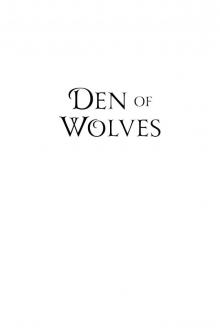 Den of Wolves
Den of Wolves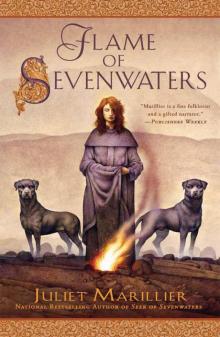 Flame of Sevenwaters
Flame of Sevenwaters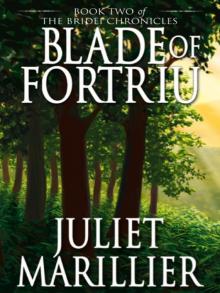 Blade of Fortriu
Blade of Fortriu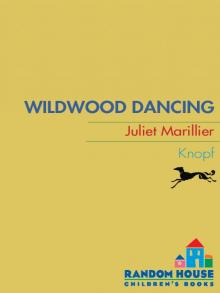 Wildwood Dancing
Wildwood Dancing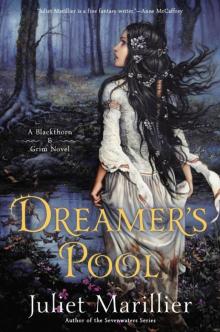 Dreamer's Pool
Dreamer's Pool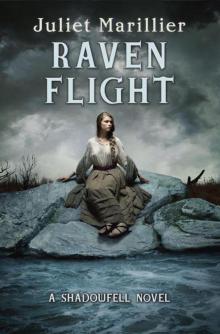 Raven Flight
Raven Flight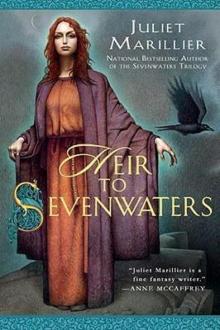 Heir to Sevenwaters
Heir to Sevenwaters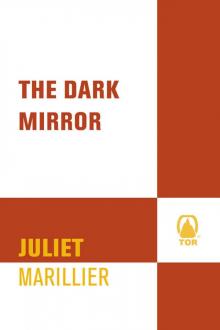 The Dark Mirror
The Dark Mirror Daughter of the Forest
Daughter of the Forest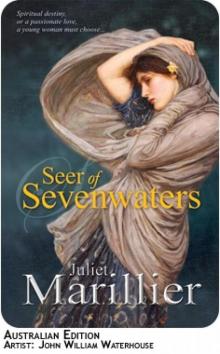 Seer of Sevenwaters
Seer of Sevenwaters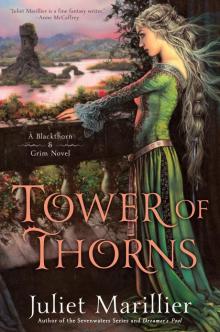 Tower of Thorns
Tower of Thorns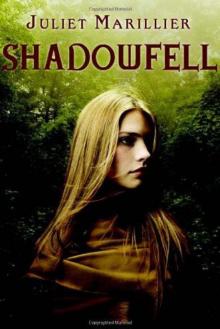 Shadowfell
Shadowfell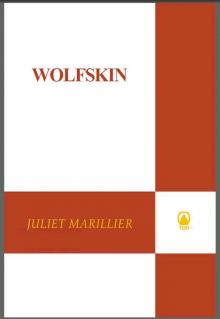 Wolfskin
Wolfskin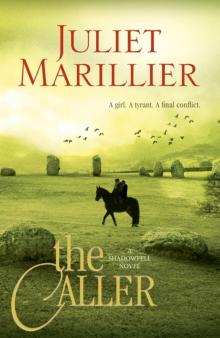 The Caller
The Caller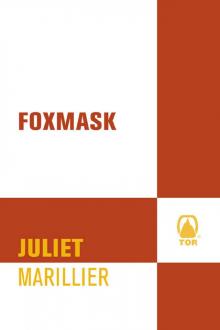 Foxmask
Foxmask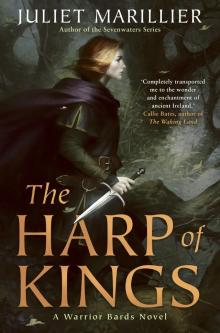 Harp of Kings
Harp of Kings The Well of Shades
The Well of Shades Heart's Blood
Heart's Blood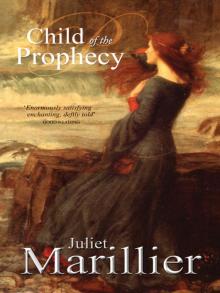 Child of the Prophecy
Child of the Prophecy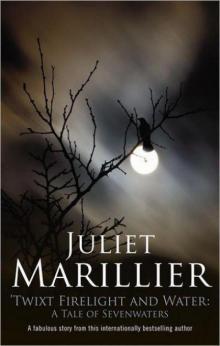 Twixt Firelight and Water
Twixt Firelight and Water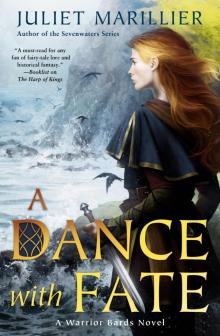 A Dance with Fate
A Dance with Fate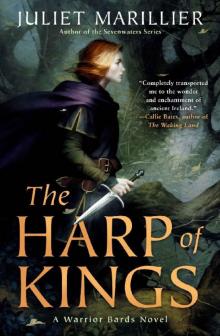 The Harp of Kings (Warrior Bards)
The Harp of Kings (Warrior Bards)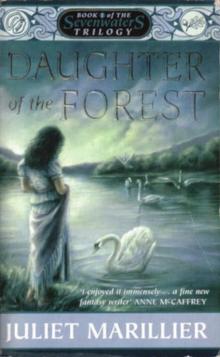 Daughter of the Forest (The Sevenwaters Trilogy)
Daughter of the Forest (The Sevenwaters Trilogy)![Sevenwaters [06] Flame of Sevenwaters Read online](http://i1.bookreadfree.com/i2/04/08/sevenwaters_06_flame_of_sevenwaters_preview.jpg) Sevenwaters [06] Flame of Sevenwaters
Sevenwaters [06] Flame of Sevenwaters![[Sevenwaters 04] Heir to Sevenwaters Read online](http://i1.bookreadfree.com/i2/04/12/sevenwaters_04_heir_to_sevenwaters_preview.jpg) [Sevenwaters 04] Heir to Sevenwaters
[Sevenwaters 04] Heir to Sevenwaters